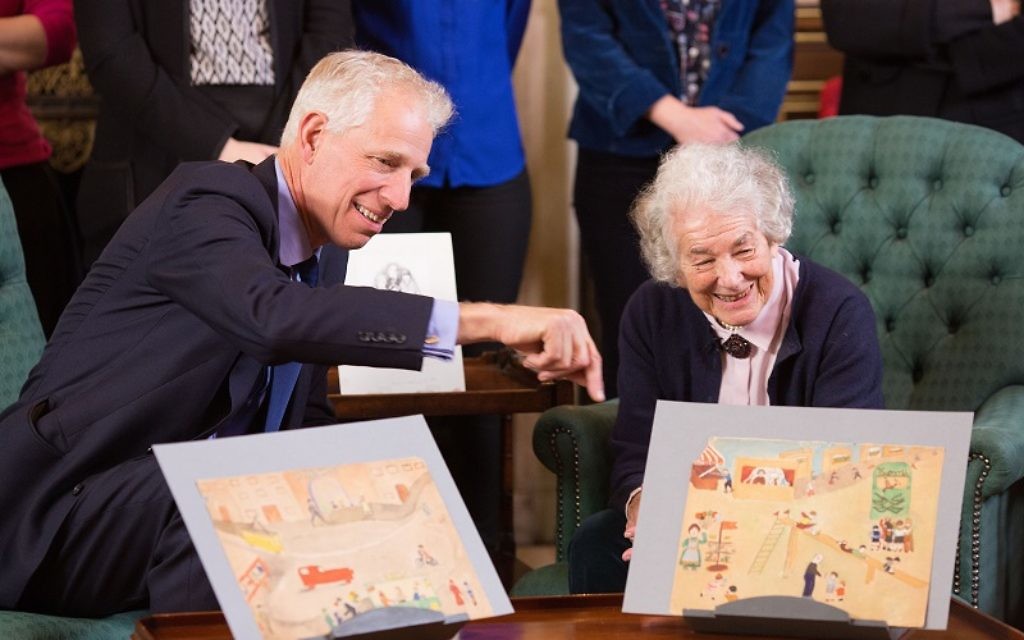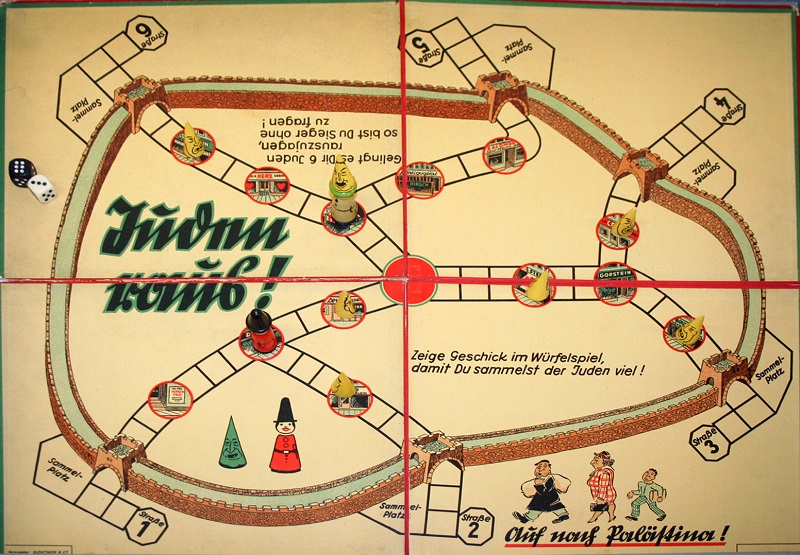Fragments of the Holocaust shown in Antiques Roadshow special
A concept born from an idea by writer Jenni Frazer has resulted in a unique Holocaust Memorial episode of Antiques Roadshow

It’s just over three years since I went on a press trip to Yad Vashem and was knocked sideways by the astonishing contents of the archives, housed beneath the main building in an area not open to the public.
There, side by side with a teddy bear that had somehow survived the war years, were the original IBM computer cards for the Mauthausen concentration camp, with the reason for imprisonment recorded on every card: “Hungarian Jew”.
We saw two halves of a photograph of two Jewish women which had been meticulously rejoined, years after being ripped in two (one woman died, the other survived); we saw a diary in Romanian, signed by every pupil who had been taught by the man who had written it and kept for years by his widow, who could not read the language.
Get The Jewish News Daily Edition by email and never miss our top stories Free Sign Up
How, I asked, do you get this material? The archivist told me experts from the museum take to the road a couple of times a year, advertising ahead that they will be arriving in an Israeli town.
Under the banner Gathering the Fragments, the staff from Yad Vashem invite survivors — or, more usually these days, their families — to bring forward objects of interest to be assessed.
Where possible, people are asked to donate material to Yad Vashem, but where this cannot be done, the experts make scans and copies. Whichever the case, people are given some better idea of the jigsaw pieces that make up the Holocaust.
I asked if this venture had ever taken place outside Israel, and was told it had not. So I asked if Yad Vashem might consider holding a Gathering the Fragments event in Britain, a place with just the right kind of critical mass of survivors and refugees.

Britain also had one more element that I thought important: the numbers of Jews who were allowed in to the country before the war on domestic visas, many of whom had married into the general population.
There must be, I thought, descendants of those Austrian and German Jews who had material they did not understand and didn’t know what to do with.
Everyone I spoke to in the ensuing two-and-a-half years agreed that it was a great idea, but no one could quite make the moves to make it happen.
Then last April — after sustained nagging on my part — I was introduced to a civil servant at the Cabinet Office who was involved in Britain’s Holocaust Memorial Foundation, which is due to build a memorial and learning centre in the parliamentary area.
We met several times while I outlined the idea and — flippantly, I admit — told the civil servant that a friend of mine had characterised Gathering the Fragments as “Antiques Roadshow Meets the Holocaust”.
A lightbulb appeared to have illuminated over her head. She would, she said, get on to the BBC right away.
This is why I found myself, on a cold November morning, in the gold rococo surroundings of the Foreign Office’s grand Locarno Rooms, where the resulting special Antiques Roadshow was being filmed.
Separately from my idea, the Holocaust Memorial Foundation had already commissioned TV presenter Natasha Kaplinsky to interview just over 100 survivors and rescuers, whose brief testimony will be interspersed with the programme.
On a plush Foreign Office couch lay a folded pair of striped trousers, worn by a man named Joe on the day of his liberation from the Auschwitz concentration camp
Regular Antiques Roadshow presenters Fiona Bruce, Mark Smith and Paul Atterbury floated among the survivors present, some of whose stories they already knew.
At regular intervals, one could hear voices shouting “Natasha!” as people strove to attract the newsreader’s attention.
Several survivors appeared to have been invited along at the last minute merely to display their yellow stars: it’s fair to say they weren’t thrilled about this.
But for those who were able to relate their stories on film, the opportunity was a once-in-a-lifetime one.
They included Naomi Gryn, daughter of the late Reform Rabbi Hugo Gryn, who had brought silver Judaica buried in the garden of their home in Carpathia by Hugo’s brave mother, Bella.
She survived the war and was subsequently able to dig up the chanukiah, Kiddush cup and silver candlesticks, all of which are still in use today by the Gryn family.
On a plush Foreign Office couch lay a folded pair of striped trousers, worn by a man named Joe on the day of his liberation from the Auschwitz concentration camp.
A visibly-shaken Bruce spoke to Joe’s widow, Sybil, who now lives in Edgware. She said she had never been able to get rid of the trousers, as they were so much a part of her husband’s life.
In an anteroom, two women produced some grisly “jewellery” made in Belsen and presented to their uncle, a chaplain with the liberating forces in 1945.
There was a brooch made from the wire on Red Cross parcels, and a cameo made from the bone handle of a toothbrush.
The Wiener Library’s Ben Barkow brought a repellent board game, Jews Out, one of three such copies held by the library; and, in a note of hope, Julia Burton and Sue Bermange of the ’45 Aid Society brought the four extraordinary Memory Quilts, which represent the lives of “the Boys”, the 732 Jewish orphans taken in by Britain after the war.
The programme is not what Gathering the Fragments aims to be — but it is a meaningful look at some of the objects that formed the framework of the Holocaust.
It seems a shame that many of the stories will remain untold on the programme — but perhaps this is a worthwhile project for the future, and the planned British Holocaust Memorial learning centre.
Antiques Roadshow Holocaust Memorial will be screened on Sunday, 15 January at 7.30pm, on BBC1

Thank you for helping to make Jewish News the leading source of news and opinion for the UK Jewish community. Today we're asking for your invaluable help to continue putting our community first in everything we do.
For as little as £5 a month you can help sustain the vital work we do in celebrating and standing up for Jewish life in Britain.
Jewish News holds our community together and keeps us connected. Like a synagogue, it’s where people turn to feel part of something bigger. It also proudly shows the rest of Britain the vibrancy and rich culture of modern Jewish life.
You can make a quick and easy one-off or monthly contribution of £5, £10, £20 or any other sum you’re comfortable with.
100% of your donation will help us continue celebrating our community, in all its dynamic diversity...
Engaging
Being a community platform means so much more than producing a newspaper and website. One of our proudest roles is media partnering with our invaluable charities to amplify the outstanding work they do to help us all.
Celebrating
There’s no shortage of oys in the world but Jewish News takes every opportunity to celebrate the joys too, through projects like Night of Heroes, 40 Under 40 and other compelling countdowns that make the community kvell with pride.
Pioneering
In the first collaboration between media outlets from different faiths, Jewish News worked with British Muslim TV and Church Times to produce a list of young activists leading the way on interfaith understanding.
Campaigning
Royal Mail issued a stamp honouring Holocaust hero Sir Nicholas Winton after a Jewish News campaign attracted more than 100,000 backers. Jewish Newsalso produces special editions of the paper highlighting pressing issues including mental health and Holocaust remembrance.
Easy access
In an age when news is readily accessible, Jewish News provides high-quality content free online and offline, removing any financial barriers to connecting people.
Voice of our community to wider society
The Jewish News team regularly appears on TV, radio and on the pages of the national press to comment on stories about the Jewish community. Easy access to the paper on the streets of London also means Jewish News provides an invaluable window into the community for the country at large.
We hope you agree all this is worth preserving.
-
By Brigit Grant
-
By Laurent Vaughan - Senior Associate (Bishop & Sewell Solicitors)
-
By Laurent Vaughan - Senior Associate (Bishop & Sewell Solicitors)
-
By Laurent Vaughan - Senior Associate (Bishop & Sewell Solicitors)
-
By Laurent Vaughan - Senior Associate (Bishop & Sewell Solicitors)





















